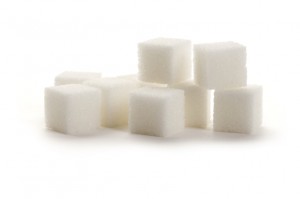Added sugar in food
Sugar is a form of carbohydrate and provides our body with kilojoules (energy). It is a naturally occurring substance in many foods such as fruit, honey, vegetables, legumes and milk and is also added to many processed foods to improve taste and texture. No matter what form it takes – raw, white, brown etc., all sugar provides the same energy per gram and no significant amounts of vitamins and minerals.
Not all high sugar foods are equal
There are many foods such as fruit and dairy products that contain significant amounts of sugar but are also a good source of nutrients such as vitamins, minerals and fibre. It is the ‘added sugars’ found in occasional foods such as soft drinks, cakes, biscuits and confectionary that should be avoided. These foods lack the vitamins, minerals and fibre of foods naturally high in sugar.
Identifying added sugar
Always read the nutrition information panel and the ingredients list on the product label to help you determine how much added sugar the food contains. Natural sugar and added sugar will both be listed under ‘sugars’ on the nutrition information panel. It is important to refer to the ingredients list to see if the sugars are natural or added. Only added sugars will be listed on the ingredients list. Common sugars listed are raw sugar, honey, brown sugar, cane sugar, dextrose, fructose, sucrose, lactose, glucose, malt syrup, molasses, agave nectar, barley malt and caramel. The higher the ingredient is on the list, the larger the quantity of it in the product.
Limit intake of foods containing added sugars
Excessive consumption of foods containing added sugars can contribute to multiple health problems including obesity and tooth decay. The Australian Dietary Guidelines recommend limiting the intake of foods that have added sugars such as jams, confectionery, biscuits, cakes, ice cream, and syrups; as well as drinks such as soft drinks, energy drinks, cordials, fruit drinks, flavoured waters or sports drinks. These foods are classified as ‘discretionary choices’. It is recommended that children up to 8 years of age have no more than ½ a serve of discretionary choices per day while for older children and adolescents who are more active and not above their healthy weight range have no more than 0-2 ½ serves.
A serve is equivalent to:
• ½ a small chocolate bar (25g)
• 5-6 small lollies
• 1 slice of cake or small muffin (40g)
• 2-3 sweet biscuits (35g)
• 2 scoops of ice cream
• 1 tablespoon jam/honey.
Sugar-sweetened drinks
Sugar-sweetened drinks including soft drinks, cordials, vitamin waters, fruit drinks, energy and sports drinks, are the biggest contributor of added sugars in the Australian diet. There is increasing evidence that consumption of sugar-sweetened drinks is related to excess weight gain and therefore these drinks should be limited in children’s diets (see above guidelines under ‘Limit intake of foods containing added sugars’).
Flavoured milk
While flavoured milk does contain added sugar, it also provides many nutrients that are beneficial to children such as protein and calcium. It is important to remember that approximately 50 per cent of the sugar content of flavoured milk is in fact lactose which is a naturally occurring sugar in milk. Under the NSW Healthy School Canteen Strategy, flavoured milk is considered ‘Everyday’ and has a maximum portion size of 300ml for primary schools and 500ml for secondary schools.
Overindulging in foods with added sugar is easy. The following tips can help you to limit the amount of added sugar in your families diet:
• Reduce the quantity of sugar or sweet syrups you add to homemade foods such as cakes and slices. Often you won’t even notice a difference in taste.
• Ensure your fridge is full of fresh fruit and vegetables to encourage these foods as snacks instead of biscuits, cakes or confectionery.
• Use the nutrition information panel and ingredients list on packaged foods to choose those lower in added sugar.
• Make water or reduced fat milk the drinks of choice and avoid sugar-sweetened drinks.
• Choose foods naturally high in sugar if you need a sugar hit, rather than food with added sugars.






